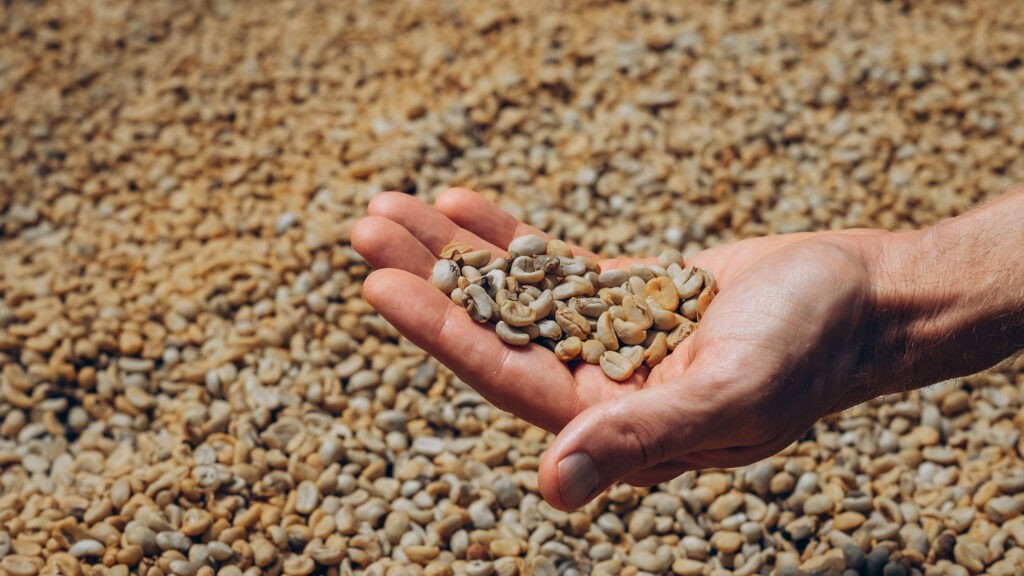Decaffeinated coffee offers a delightful alternative for coffee enthusiasts seeking to enjoy the rich flavors and social aspects of coffee without the full jolt of caffeine. While decaf coffee contains a minimal amount of caffeine, understanding How Much Caffeine Is In Decaffeinated Coffee is crucial for those monitoring their caffeine intake. For personalized guidance on managing your caffeine consumption or exploring the benefits of decaf, connect with our expert PhDs at HOW.EDU.VN today. This article delves into the caffeine content of decaf, its health benefits, and the decaffeination process, providing a comprehensive overview for informed coffee lovers.
1. Decaf Coffee vs. Regular Coffee: Understanding the Caffeine Difference
The primary distinction between decaf and regular coffee lies in their caffeine content. The decaffeination process aims to remove a significant portion of the caffeine from coffee beans.
1.1. Caffeine Levels in Decaf vs. Regular
- Regular Coffee: An 8-ounce cup of regular brewed coffee typically contains around 95 mg of caffeine.
- Decaf Coffee: Decaffeination removes approximately 97% of the caffeine. An 8-ounce cup of decaf coffee contains about 2-15 mg of caffeine.
This significant reduction allows individuals sensitive to caffeine to enjoy coffee without experiencing unwanted side effects such as jitters or sleep disturbances.
1.2. Why Choose Decaf?
Choosing decaf coffee can be beneficial for several reasons:
- Caffeine Sensitivity: Individuals sensitive to caffeine may experience anxiety, insomnia, or digestive issues from regular coffee.
- Medical Conditions: Some medical conditions require limiting or avoiding caffeine.
- Evening Consumption: Enjoying a cup of coffee in the evening without disrupting sleep.
- Pregnancy: Pregnant women are often advised to limit caffeine intake.
Understanding the caffeine content helps individuals make informed choices based on their health needs and preferences.
2. Caffeine Intake: Fitting It Into a Healthy Diet
For most adults, moderate caffeine consumption can be part of a balanced diet. However, individual tolerances vary.
2.1. Recommended Caffeine Intake
Health authorities generally recommend that adults consume no more than 400 mg of caffeine per day. This is equivalent to about 2-3 cups (12 ounces each) of brewed coffee.
2.2. Factors Affecting Caffeine Tolerance
Several factors can influence how caffeine affects individuals:
- Body Weight: Lighter individuals may be more sensitive to caffeine.
- Genetics: Genes influence how quickly the body metabolizes caffeine.
- Medications: Certain medications can interact with caffeine.
- Health Conditions: Some health conditions, such as anxiety or heart issues, may require limiting caffeine.
2.3. Monitoring Caffeine Sources
Caffeine is present in various foods and beverages, including:
- Coffee
- Tea
- Soda
- Chocolate
- Energy Drinks
- Some Medications
Considering all caffeine sources is essential to stay within recommended limits.
2.4. Need Help Determining What’s Right for You?
- Expert Guidance: Consult your healthcare provider for personalized advice.
- Stay Informed: Keep up to date with current health recommendations from recognized authorities.
- Track Your Body’s Response: Pay close attention to how your body reacts to caffeine.
3. Health Benefits of Decaf Coffee
Decaf coffee offers many of the same health benefits as regular coffee, without the high caffeine content.
3.1. Antioxidant Properties
Coffee beans contain antioxidants, which help protect the body against cellular damage. Decaffeination does not significantly reduce these beneficial compounds.
3.2. Reduced Risk of Chronic Diseases
Studies suggest that decaf coffee consumption is associated with a reduced risk of:
- Type 2 Diabetes
- Heart Disease
- Certain Cancers
3.3. Improved Cognitive Function
Research indicates that decaf coffee may improve memory, cognition, and mood.
3.4. Longevity
A large-scale study using UK Biobank data found that drinking 3 cups of any kind of coffee per day was associated with a 12% reduction in overall mortality. The study specified that “Similar associations were observed for instant, ground, and decaffeinated coffee.”
These health benefits make decaf coffee a healthy beverage option for those who enjoy coffee but need to limit caffeine.
4. The Decaffeination Process: How It Works
Decaffeination involves removing caffeine from green, unroasted coffee beans. There are several methods, each with its own advantages.
4.1. Common Decaffeination Methods
- European Method (Solvent-Based): Coffee beans are steamed to open their pores and then rinsed with a liquid solvent (such as methylene chloride or ethyl acetate) to remove caffeine. The solvent is then removed, and the beans are dried and roasted.
- Swiss Water Process: This method uses water and activated charcoal to remove caffeine. The beans are soaked in hot water, which is then passed through activated charcoal filters that trap caffeine molecules.
- CO2 Method: Uses liquid carbon dioxide to extract caffeine. This method is considered environmentally friendly and effective.
- Triglyceride Method: Beans are soaked in coffee oils, which attract and remove caffeine.
4.2. Safety of Decaffeination Methods
All approved decaffeination methods are considered safe by food safety regulators in the United States, Europe, and other countries. The FDA sets rigorous standards for residual solvent levels in decaf coffee to ensure consumer safety.
4.3. The European Method in Detail
The European Method is one of the most common decaffeination processes, involving five steps:
- Steaming: Coffee beans are steamed to open their pores, making caffeine more accessible.
- Solvent Rinse: The beans are rinsed with a liquid solvent, which bonds to and removes caffeine.
- Solution Removal: The liquid solution containing the extracted caffeine is removed.
- Caffeine Extraction: Caffeine is extracted from the rinsing solution for use in other products. Nearly 100% of the rinsing solution is captured and reused in a closed-loop system.
- Drying and Roasting: The decaffeinated coffee beans are dried and roasted, just like caffeinated coffee beans.
4.4. Expert Insights on Choosing the Right Method
| Decaffeination Method | Description | Pros | Cons |
|---|---|---|---|
| European Method | Steamed beans rinsed with solvent, solvent removed, caffeine extracted, beans dried & roasted. | Effective, widely used, efficient closed-loop system. | Use of solvents (though regulated for safety). |
| Swiss Water Process | Beans soaked in hot water, water filtered through activated charcoal to trap caffeine molecules. | Solvent-free, retains coffee flavor. | More expensive, may remove some flavor compounds. |
| CO2 Method | Liquid carbon dioxide extracts caffeine from beans. | Environmentally friendly, preserves flavor well. | More complex equipment needed. |
| Triglyceride Method | Beans soaked in coffee oils, which attract and remove caffeine. | Uses naturally occurring substances. | Can be less efficient, may affect flavor profile. |



4.5. Regulations and Standards
The FDA has set rigorous standards for decaf coffee, ensuring that any residual solvents are at levels that pose no risk to consumers. The U.S. Food and Drug Administration (FDA) has said that risk to consumers from drinking European Method decaf is “essentially non-existent.”
5. Decaf Coffee Safety: Addressing Concerns
Despite its benefits, decaf coffee has faced scrutiny. It’s crucial to address these concerns with scientifically backed information.
5.1. Debunking Decaf Myths
Some activists have proposed banning decaf coffee and imposing misleading warning labels, but these proposals are not supported by scientific evidence. The National Coffee Association (NCA) has detailed the evidence establishing the safety of European Method decaf in comments to the U.S. Food and Drug Administration (FDA), opposing a petition by activists seeking a federal decaf ban.
5.2. Expert Commentary on Misleading Information
“It’s essential to base our understanding of decaf coffee safety on scientific data and regulatory standards, rather than unverified claims. The comprehensive reviews by the FDA and other international bodies ensure the safety of decaffeination processes,” advises Dr. Emily Carter, a food safety expert.
5.3. How to Stay Informed
- Consult Experts: Seek guidance from healthcare providers or dietitians.
- Review Regulatory Standards: Familiarize yourself with FDA guidelines on caffeine and decaffeination.
- Check Reputable Sources: Refer to the National Coffee Association (NCA) and other trusted organizations for accurate information.
6. Enjoying Decaf: Varieties, Roasts, and Brewing Methods
Whether you prefer caffeinated or decaffeinated coffee, exploring different options can enhance your coffee experience.
6.1. Coffee Varieties
Different coffee varieties offer unique flavor profiles:
- Arabica: Known for its smooth, aromatic flavor.
- Robusta: Stronger, bolder flavor with a higher caffeine content (typically used in regular coffee).
- Excelsa and Liberica: More niche varieties with distinct characteristics.
6.2. Roasting Levels
Roasting levels impact the taste of coffee:
- Light Roast: Mild, delicate flavor with higher acidity.
- Medium Roast: Balanced flavor and acidity.
- Dark Roast: Bold, smoky flavor with lower acidity.
6.3. Brewing Methods
Various brewing methods can highlight different aspects of coffee:
- Drip Coffee: Consistent and easy to make.
- Pour-Over: Allows for greater control over the brewing process.
- French Press: Produces a full-bodied, rich cup of coffee.
- Espresso: Concentrated coffee brewed under high pressure.
7. Why Choose HOW.EDU.VN for Expert Advice on Decaf Coffee?
Navigating the world of coffee, including decaf options, can be complex. At HOW.EDU.VN, we connect you with leading PhDs and experts who provide personalized guidance and solutions tailored to your needs.
7.1. Connect With Experts
- Diverse Expertise: Our team includes experts in food science, nutrition, and health.
- Personalized Consultations: Receive one-on-one advice tailored to your specific health needs and preferences.
- Trusted Information: Access reliable, scientifically backed information to make informed decisions.
7.2. Benefits of Consulting Our Experts
- Customized Guidance: Receive tailored recommendations for incorporating decaf coffee into your diet.
- In-Depth Knowledge: Benefit from our experts’ extensive knowledge of coffee and its health effects.
- Reliable Support: Get answers to your questions and concerns about decaf coffee and caffeine consumption.
7.3. Expert Takeaways
- Health and Nutrition: “Incorporating decaf coffee into your diet can be a smart move, especially if you’re managing caffeine sensitivity or looking for the antioxidant benefits without the jitters. It’s all about balance and understanding your body’s needs.” – Dr. Sarah Johnson, Nutritionist
- Wellness Strategies: “Decaf coffee can be a part of a holistic approach to wellness, providing comfort and social connection without the downsides of caffeine. It’s essential to choose high-quality beans and brewing methods to maximize the benefits.” – Dr. Mark Thompson, Wellness Expert
- Lifestyle Adjustments: “Switching to decaf doesn’t mean sacrificing the joy of coffee. It’s about making informed choices that align with your lifestyle and health goals. Small changes can make a big difference in overall well-being.” – Dr. Lisa White, Lifestyle Coach
7.4. How to Get Started with HOW.EDU.VN
- Visit Our Website: Explore our resources and learn more about our experts.
- Contact Us: Reach out to schedule a consultation.
- Get Personalized Advice: Receive customized guidance to optimize your coffee consumption.
8. FAQs About Decaf Coffee
8.1. What is the primary purpose of decaffeinating coffee beans?
The primary purpose is to reduce the caffeine content, making it suitable for individuals sensitive to caffeine or those who want to avoid its stimulating effects.
8.2. Are there any side effects associated with drinking decaf coffee?
Decaf coffee is generally safe, but some individuals may experience minor digestive issues or allergic reactions.
8.3. How does decaf coffee compare to regular coffee in terms of taste?
The taste can vary depending on the decaffeination method and coffee bean quality, but high-quality decaf coffee can closely resemble regular coffee in flavor.
8.4. Can pregnant women drink decaf coffee?
Yes, decaf coffee is generally considered safe for pregnant women as it contains significantly less caffeine than regular coffee.
8.5. Is decaf coffee suitable for people with heart conditions?
Decaf coffee can be a better option for individuals with heart conditions who need to limit caffeine intake.
8.6. What are the best decaffeination methods to look for when buying decaf coffee?
Look for decaf coffee that uses the Swiss Water Process or CO2 Method, as they are solvent-free and environmentally friendly.
8.7. How can I ensure that I am buying high-quality decaf coffee?
Check for reputable brands, look for certifications like “Swiss Water Process,” and read customer reviews to ensure quality.
8.8. Does decaf coffee still provide any health benefits?
Yes, decaf coffee retains many of the antioxidants and health benefits of regular coffee, such as reduced risk of chronic diseases.
8.9. Can decaf coffee affect sleep patterns?
Since decaf coffee contains minimal caffeine, it is less likely to disrupt sleep patterns compared to regular coffee.
8.10. How much caffeine is considered safe to consume daily?
Health authorities generally recommend that adults consume no more than 400 mg of caffeine per day.
8.11. Where can I find reliable experts to advise me on coffee consumption and its health implications?
At HOW.EDU.VN, we connect you with leading PhDs and experts who provide personalized guidance.
9. Take the Next Step: Contact HOW.EDU.VN for Expert Advice
Ready to make informed choices about your coffee consumption? Contact HOW.EDU.VN today to connect with our team of expert PhDs and receive personalized guidance tailored to your needs.
9.1. Get in Touch With Us
- Address: 456 Expertise Plaza, Consult City, CA 90210, United States
- WhatsApp: +1 (310) 555-1212
- Website: HOW.EDU.VN
9.2. Transform Your Well-Being
Contact us today and discover the benefits of expert guidance. Let how.edu.vn help you make informed decisions for a healthier, more balanced life.